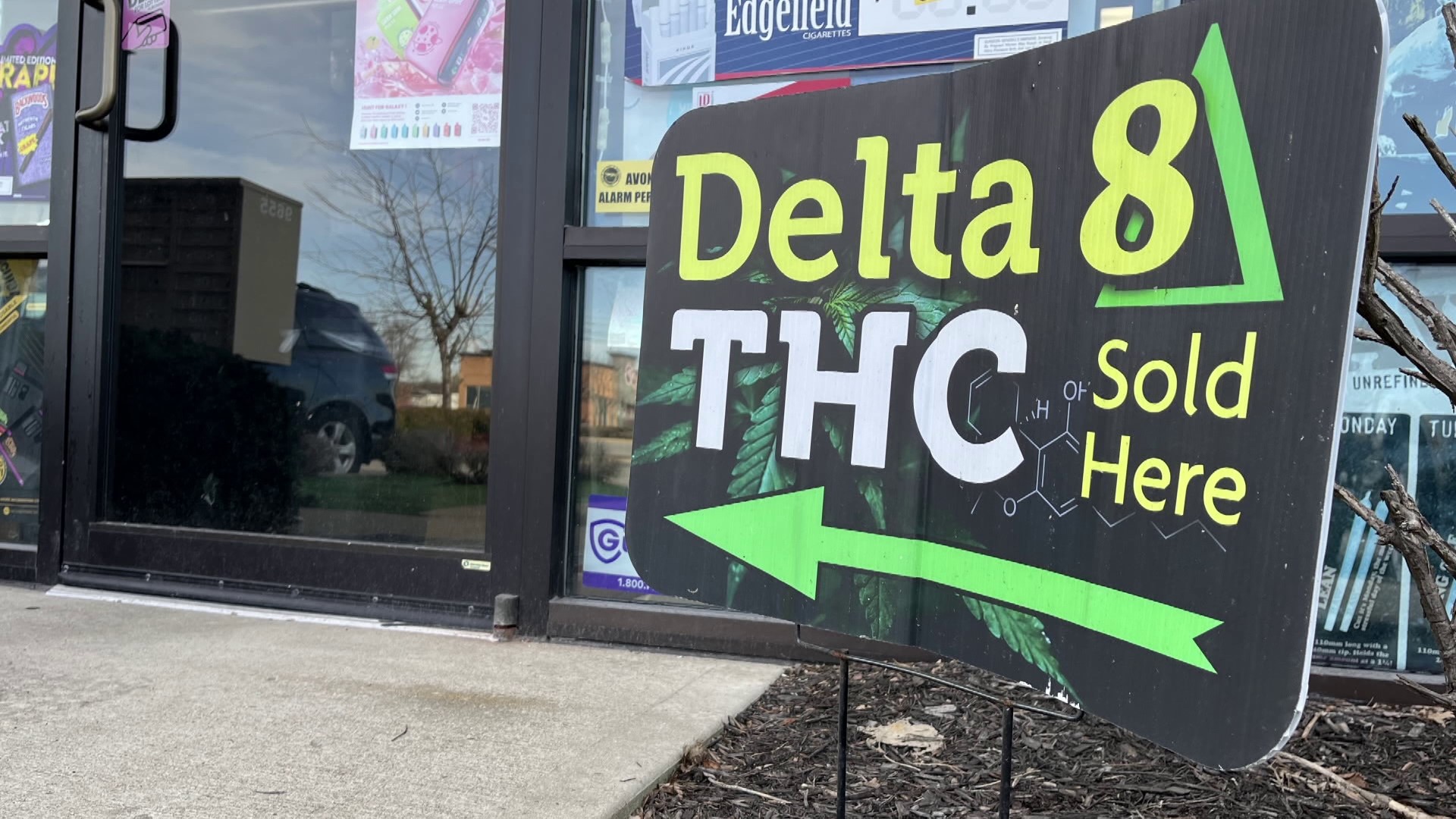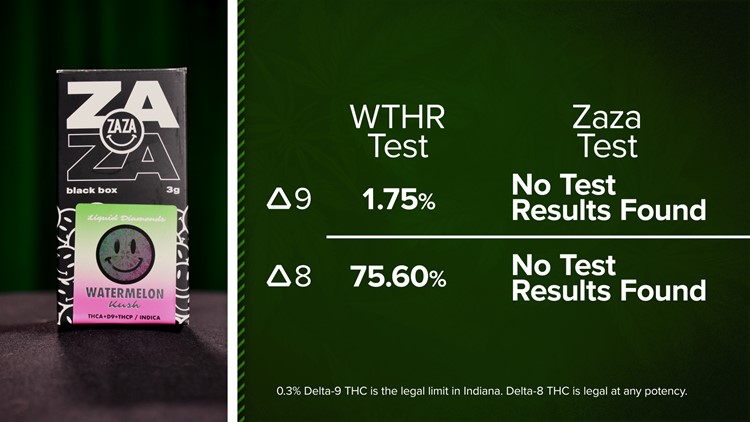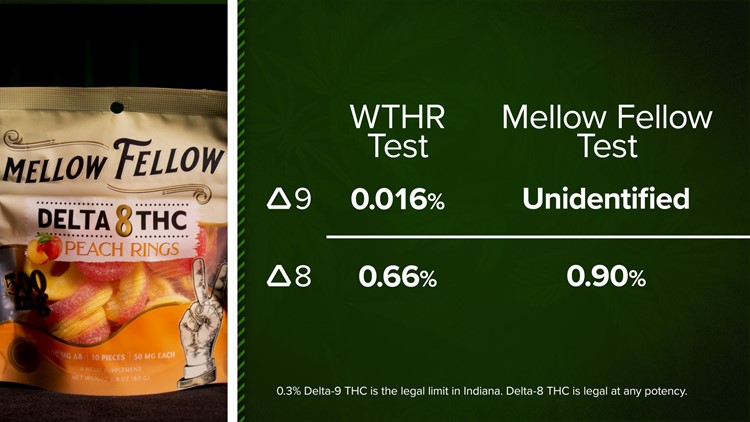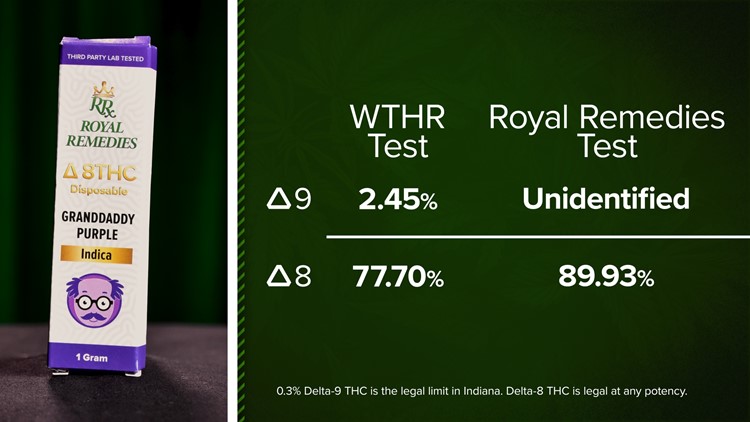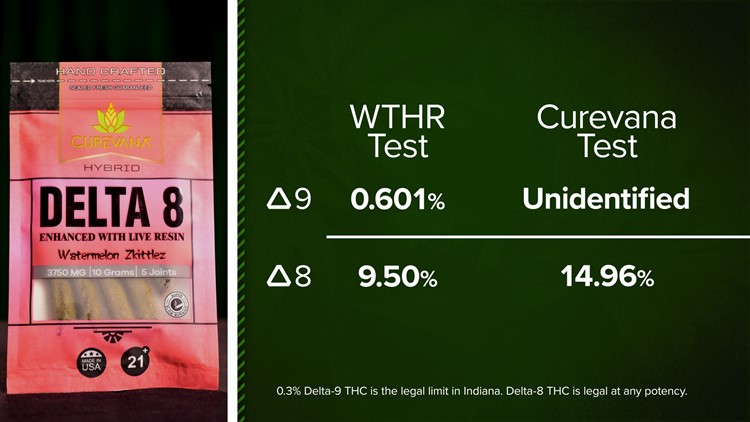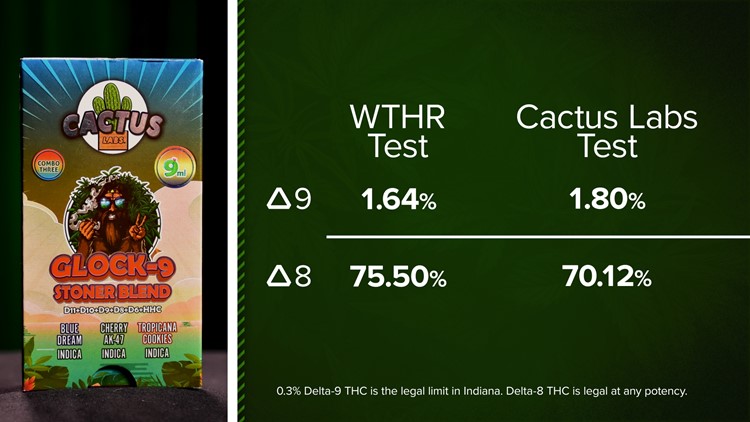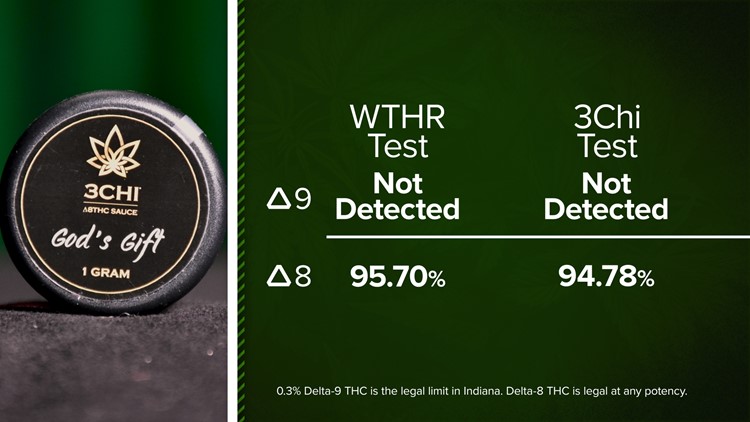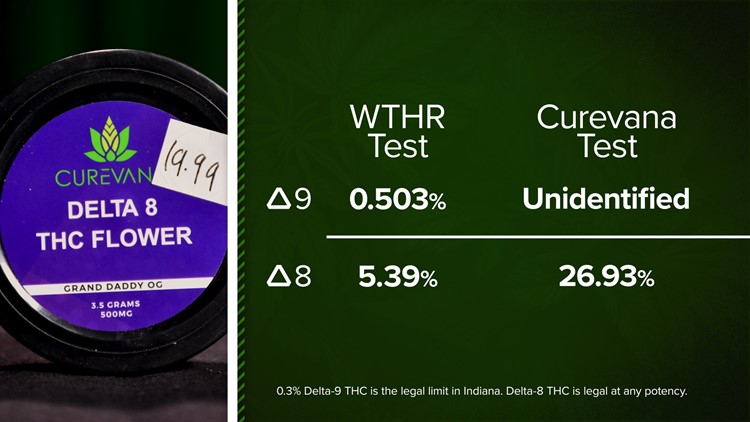INDIANAPOLIS — The popularity of Delta-8 is now on display all across central Indiana.
The substance, which is closely related to marijuana and can cause users to experience a psychoactive high, is now advertised and sold at many gas stations, smoke shops and convenience stores in Indianapolis and the suburbs – in addition to being readily available for sale on the internet.
But unlike marijuana, Indiana currently has no law addressing the possession, sale or manufacture of Delta-8, which means it can be legally sold – even to kids. The state also does not mandate specific testing protocols to ensure Delta-8 products contain legal levels of compounds and chemicals.
What is in Delta-8?
To find out, 13 Investigates purchased Delta-8 products and sent them to a lab for testing. The results show many of the products contain not only Delta-8 THC, but also levels of Delta-9 THC – the psychoactive compound found in marijuana – that are considered illegal under Indiana law.


“These results clearly show the products are not compliant, and you’re possessing marijuana at that point, whether you realize it or not,” said Justin Swanson, an Indianapolis attorney who specializes in cannabis issues and who serves as president of the Midwest Hemp Council. “It’s a big problem. There’s no repercussions for selling essentially marijuana in Indiana out of the gas station.”
The 13News investigation found:
- Indiana is flooded with Delta-8 products that do not comply with state law for the presence of Delta-9 THC.
- The labels on most of the Delta-8 products tested by 13News do not reflect the level of Delta-9 THC inside the package.
- Various testing methods used to determine the potency and legality of Delta-8 products can yield significantly different results, and some fail to detect the actual amount of Delta-9 THC in the products.
- No state agency is monitoring Delta-8 products and their testing to protect consumers from purchasing products that could put them in legal jeopardy.
- Despite multiple attempts, state lawmakers have failed to pass legislation that would regulate Delta-8 and prohibit its sale to children.
In response to 13 Investigates’ findings, some Delta-8 testing labs, retailers and manufacturers – as well as the leader of the Indiana State Police – are calling for changes to better regulate and monitor Delta-8 products.
Marijuana's "little brother"
Delta-8 is short for Delta-8 tetrahydrocannabinol, or Delta-8 THC. It is not the same as Delta-9 THC that's found in marijuana, but it's close.
Delta-9 THC in marijuana and Delta-8 THC are both cannabinoids that come from cannabis plants, and from a molecular standpoint they are nearly identical. Both can cause users to feel high, although Delta-8 THC is considered to be less psychoactive than the Delta-9 THC in marijuana.


"It's kind of like half the potency of Delta-9 THC," explained Justin Journay, CEO of 3Chi, an Indianapolis-based company that produces millions of Delta-8 products each year. "It's not as intoxicating, and so it's a good option for people who find that cannabis is their best option for whatever it is they need, but they don't want to be as high." He said many 3Chi customers rely on Delta-8 products to help them sleep or to deal with chronic pain.
Unlike Delta-9, which occurs naturally in relatively high concentrations in marijuana flowers, Delta-8 is usually found at low levels in cannabis plants and must be made synthetically. To mass produce concentrated Delta-8, most Delta-8 manufacturers rely on CBD extracted from cannabis that is then converted to Delta-8 THC through a chemical process.
At that point, it can be used to create countless products, such as gummies, vapes, cookies, drinks, concentrates, and pre-rolls (joints), and Delta-8 is now part of a multi-billion dollar industry.

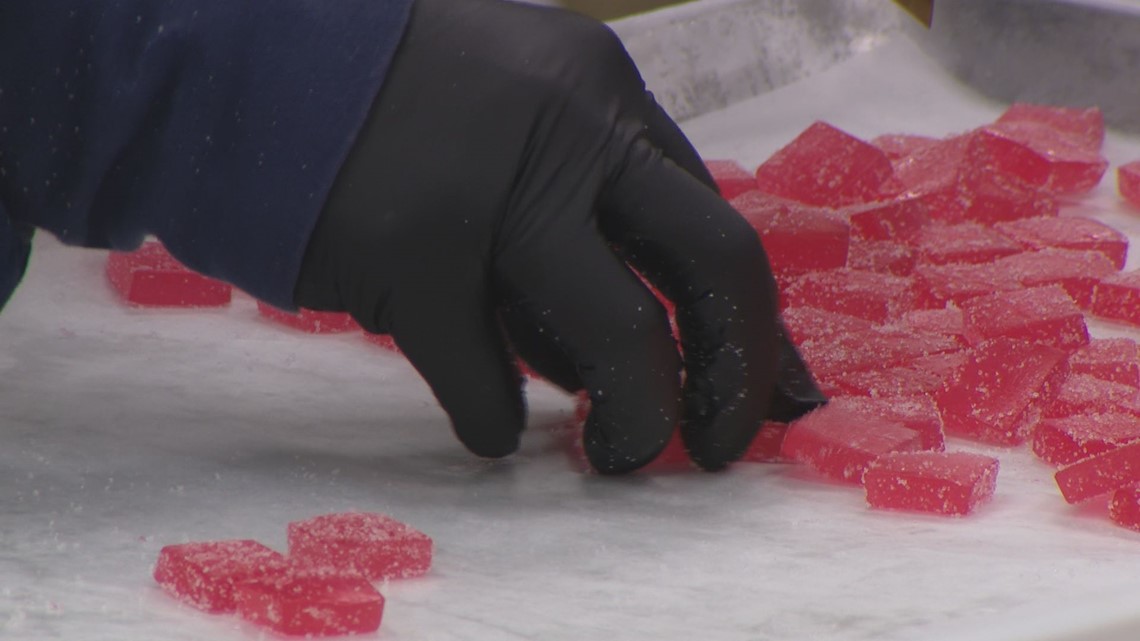
To help you understand why it's so popular, 13 Investigates visited retailers with a hidden camera so you can hear store clerks candidly describe what Delta-8 products do.
"Do you want it to make you sleepy or to just feel high?" one store clerk asked when we inquired about Delta-8.
Another clerk called it "like a little brother" to marijuana, adding that he uses Delta-8 gummies to ease his joint pain.
Asked which Delta-8 product she recommends, a suburban smoke shop worker told 13 Investigates, "They're all gonna get you high. I'm not going to lie to you. Every single one of them's gonna work. Some are just gonna work a little quicker or stronger."

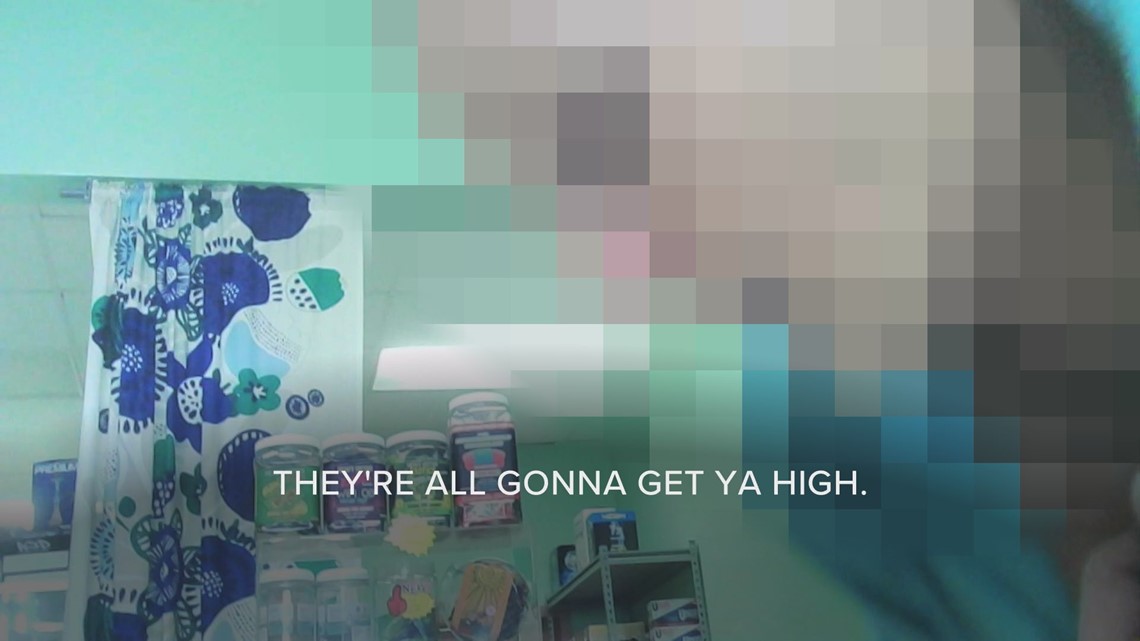
Is it legal?
Delta-8 manufacturers say their products are extracted from hemp and comply with the 2018 Farm Bill, which federally classifies all cannabis products containing less than 0.3% Delta-9 THC as legal hemp rather than marijuana.
Following the passage of the farm bill, Indiana legalized hemp products, and state lawmakers used the 0.3% Delta-9 THC cutoff to determine which "low THC hemp extract" products would become legal.
As a result, Delta-8 manufacturers insist their products comply with state and federal law – printing that right on their labels and websites – because they say the products contain levels of Delta-9 below the 0.3% threshold.

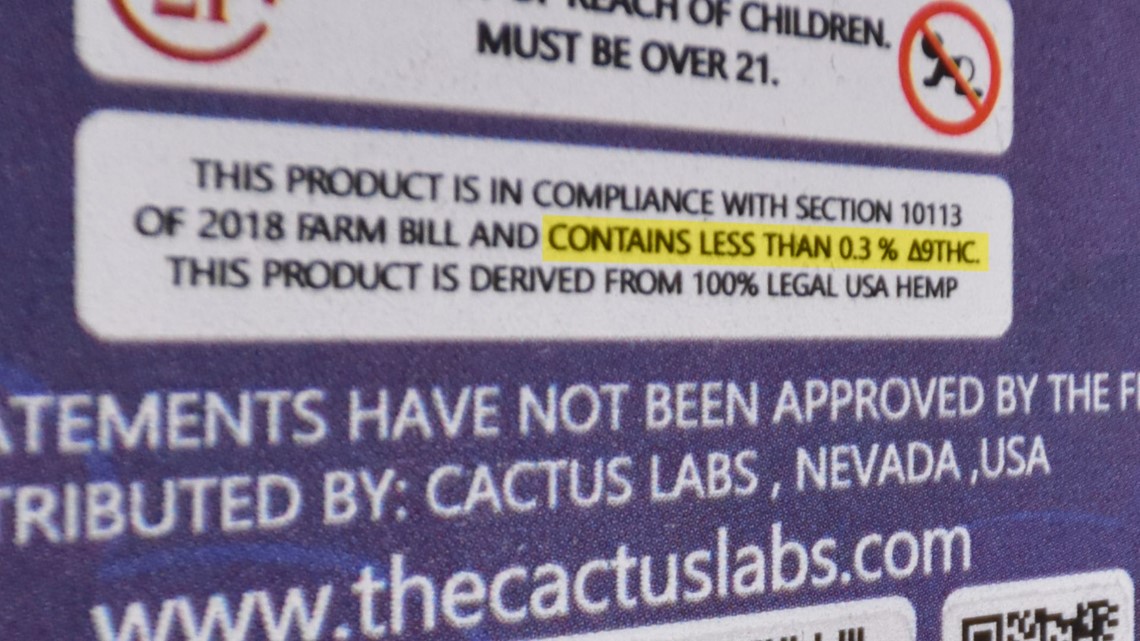
Last year, Indiana's attorney general issued an opposing opinion stating products containing Delta-8 THC are not legal under state law because he believes they do not fall into the low THC hemp extract exception created by the General Assembly. The opinion says Indiana's list of Schedule I substances "clearly includes derivatives" of cannabis plants with similar chemical structures and effects as marijuana.
Delta-8 manufacturers quickly sued the attorney general for that opinion, which initially triggered some law enforcement agencies and prosecutors to seek crackdowns on Delta-8 products in some parts of the state. But months later, as the lawsuit presses forward, sales of Delta-8 products appear to be flourishing in most parts of the state.
Law enforcement still has concerns about the products due to their psychoactive effects and widespread availability at corner shops and gas stations. And whether they truly comply with current state law continues to be a source of debate.
What's actually in it?
To determine if Delta-8 products are compliant with the 2018 Farm Bill, and therefore compliant with Indiana law, 13 Investigates decided to test some of them.
We bought seven Delta-8 products from area smoke shops and gas stations. The products included Delta-8 gummies, vapes, flower and joints purchased from stores in Indianapolis, Avon and Greenwood.
13News then sent the products to a certified testing lab near Lexington, Ky., that specializes in testing cannabis.

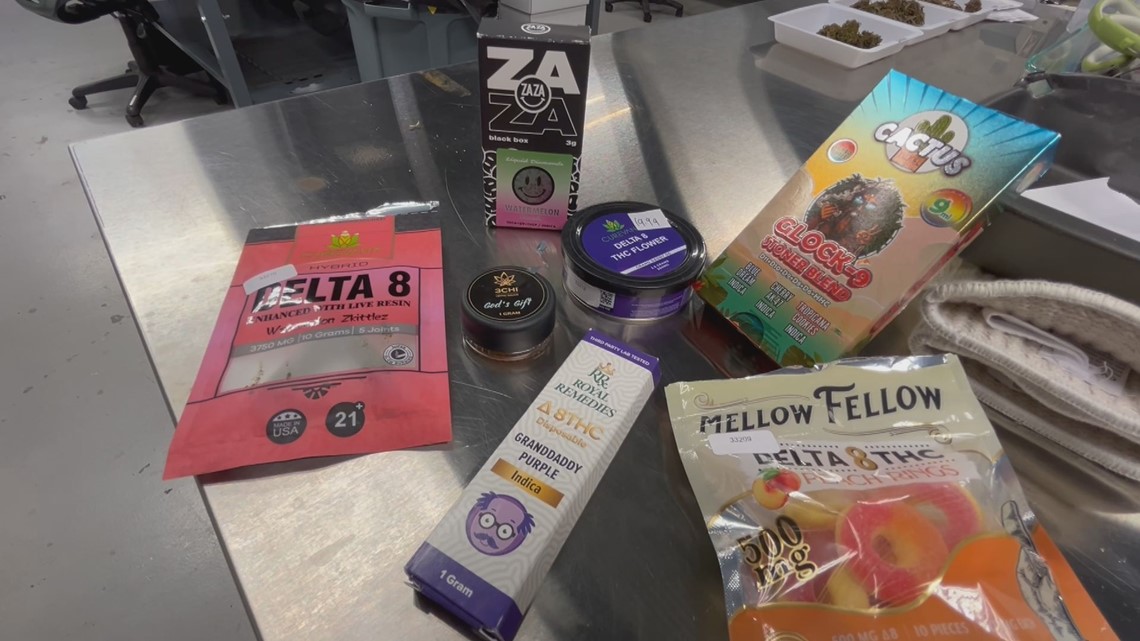
Test results provided by KCA Laboratories show all seven products do indeed contain Delta-8 THC, just as the labels suggested. The Delta-8 potency ranged from less than 1% in peach gummies and 5% in dried flower buds to more than 70% in some vapes and nearly 96% in a container of Delta-8 concentrate. Under Indiana law, there is no regulation limiting the potency of Delta-8.
But test results showed most of the products that 13News sent to the lab also contained something else.
"Five of the seven samples were found to have Delta-9 THC above .3%," explained KCA Labs chief commercial officer Ryan Bellone. "Those products would not be considered legal in Indiana."
Bellone said the Delta-8 flower (0.503% Delta-9 THC) and joints (.601% Delta-9 THC) tested roughly twice as high for Delta-9 THC as the 0.3% allowed under state law.
Each of the Delta-9 vapes tested for 13 Investigates contained much higher levels of Delta-9 THC, testing between 1.64% and 2.45%, which is five to eight times the legal limit.
Testing for Delta-8 and Delta-9 in products
“I have grave concerns over these … and anybody that doesn't probably isn't paying attention,” said Indiana State Police Superintendent Doug Carter after reviewing 13News’ test results.
The superintendent said what concerns him most about Delta-8 products is they are highly unregulated and currently can be sold to kids. Based on the testing, he also worries that many of the products may be misleading consumers.
While the products tested for 13News have labels claiming they contain less than 0.3% Delta-9 THC, KCA Labs test results show most of the products contained more.
13 Investigates found an online lab report posted by one of the vape manufacturers for a product purchased by 13News. It shows the product actually contains 1.8% Delta-9 THC, even though the label claims it contains less than 0.3%. Testing by KCA Labs for 13News confirmed the vape contains a Delta-9 level that is five to six times higher than Indiana's legal limit.
"That tells us what people are ingesting into their body is not what [the label] says," Carter said, adding that vaping that much Delta-9 can result in someone failing a drug test, losing their job or facing felony drug charges. "Everybody that buys this should understand that what they're reading is sometimes not what they're getting."

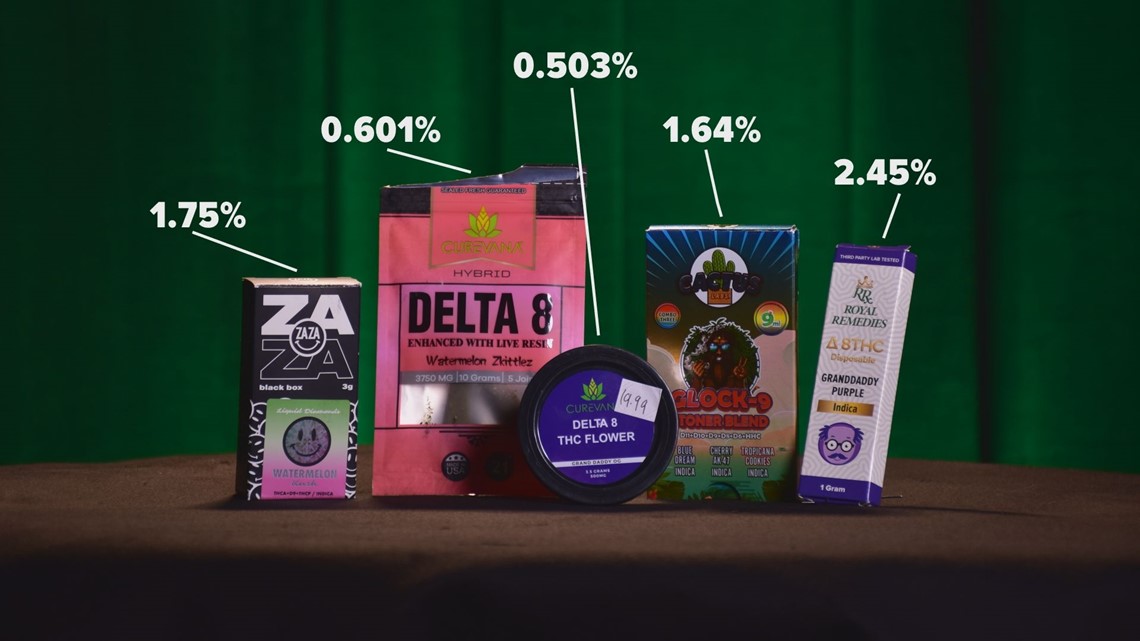
13News contacted the manufacturer of the vape product to understand why its labeling and lab results do not match, but the company has not yet responded.
"It all comes down to testing"
Hemp-derived products like Delta-8 THC are required by state law to include a scannable code on the label that can direct consumers to a certificate of analysis (COA) from a certified laboratory that proves each product was tested and contains less than 0.3% Delta-9 THC. While testing is mandated, the specific protocols used to test each product are not detailed in Indiana statute.
When 13News scanned the code on the Delta-8 products we purchased for this investigation, most of the COAs showed the labs were unable to identify how much Delta-9 was in the product. The Delta-9 THC result simply shows "UI" which means unidentified amount.

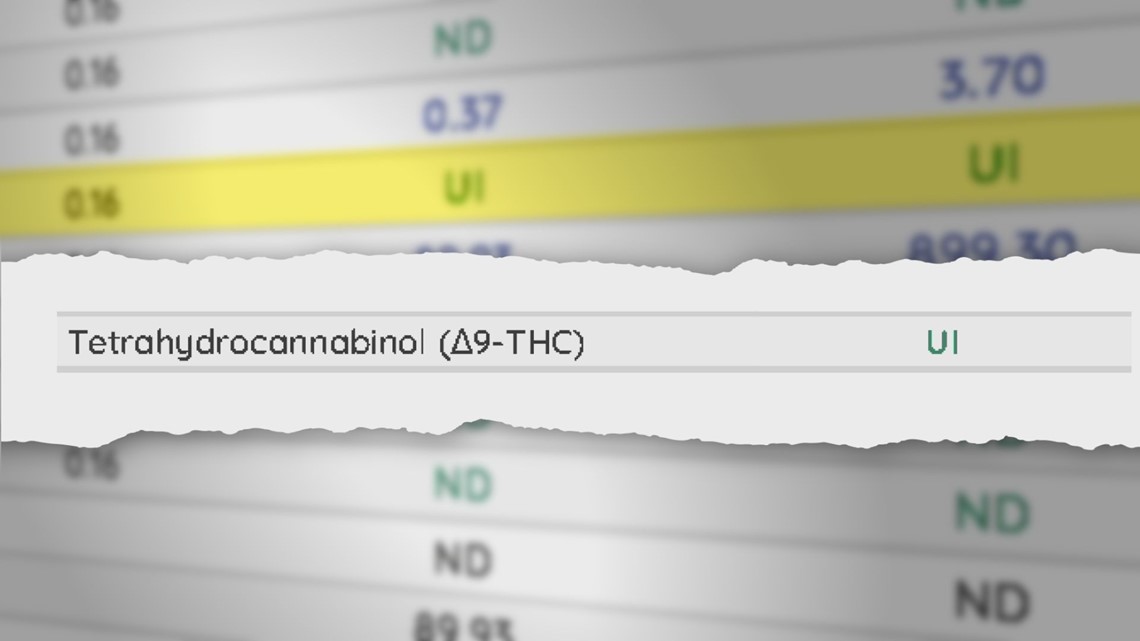
Why do some manufacturers’ test results show unidentified amounts of Delta-9 THC when the lab hired by 13News clearly identified Delta-9 THC?
"The issue is the testing. It all comes down to testing," explained Bellone.
When it comes to testing cannabis products, he says how the testing is conducted is critical. Remember, Delta-8 THC and Delta-9 THC molecules are nearly identical, and some testing methods have trouble separating those and the many other compounds found in cannabis plants.
If the testing cannot accurately separate Delta-8 and Delta-9 compounds during the testing process, the results are interpreted and reported as unidentified or non-detectable.
“That's basically the problem. In most cases, labs are reporting non-detects for Delta-9,” explained KCA Labs scientific director Dr. Richard Sams. ““The problem with this is saying there's no Delta-9 in that sample when, in fact, there is Delta-9.”

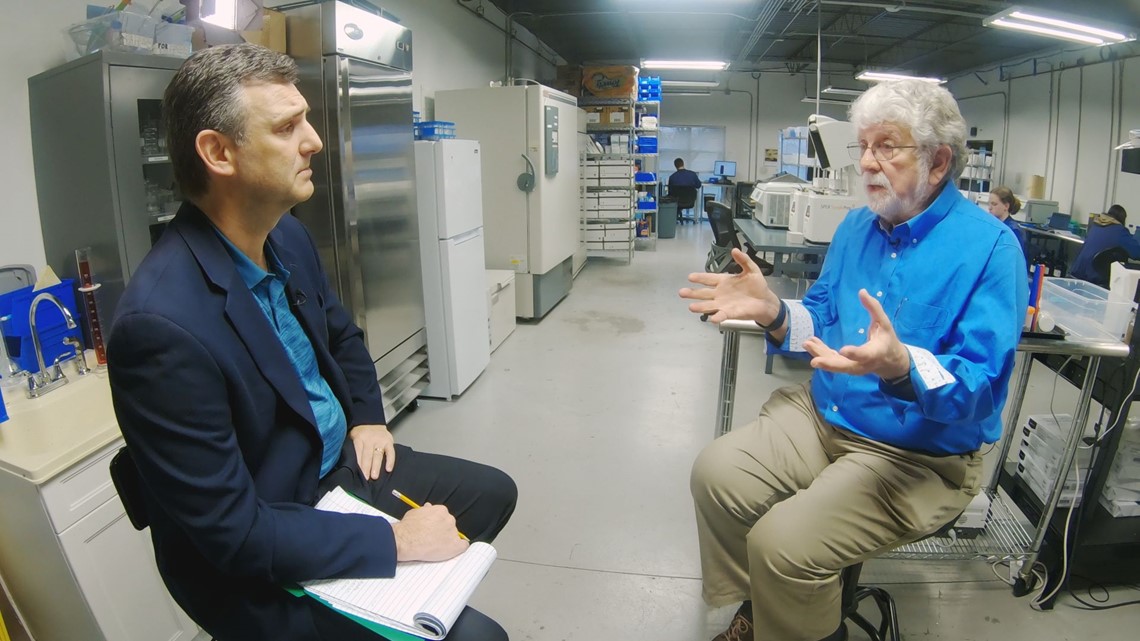
Sams said his lab uses gas chromatography–mass spectrometry (GCMS) testing machines to separate and detect the potency of each compound in Delta-8 products. That type of testing usually takes longer and costs more than high-performance liquid chromatography (HPLC) testing that is more commonly used in testing Delta-8 products.
Sams said GCMS testing is much better at accurately detecting the potency of induvial cannabinoids when testing synthetically produced cannabis products like Delta-8. He believes labs that instead utilize HPLC are not testing Delta-8 properly.
“That's what virtually all labs are using and accuracy suffers,” he told 13News. “I would have no confidence in the numerical results.”
13 Investigates contacted the labs that provided UI test results for the products purchased for this investigation. While confirming that they conducted their tests using HPLC testing, the labs said they stick by their test results and their testing methods. PharmLabs said it has relied on HPLC testing to comply with state regulations in California, but the company’s CEO also acknowledged that GCMS testing can provide clearer separation and more detailed results when testing products containing Delta-8.

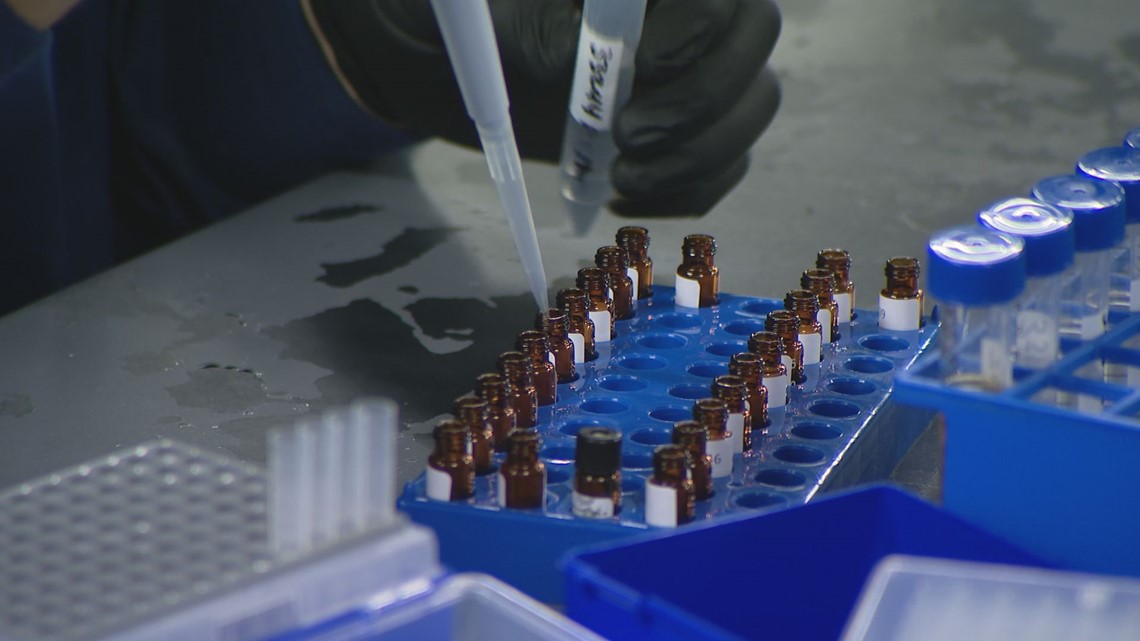
No one's watching
Journay, the CEO of Indiana-based Delta-8 manufacturer 3Chi, said testing is now "a big problem" that is giving the Delta-8 industry a black eye.
He said his company relies on its own internal testing and independent labs that use both HPLC and GCMS testing protocols to ensure his products do not contain levels on Delta-8 THC that exceed Indiana's legal limit.
13 Investigates tested a 3Chi product as part of the shipment we sent to KCA Labs in Kentucky, and it was one of only two products that tested within the legal limit for Delta-9.
"All of our products are like that," Journay said. "We cannot afford for them not to, and at the end of the day, everyone deserves to get what they pay for and to know what they are putting in their body."
3Chi allowed 13 Investigates to tour its Indianapolis processing plant, where the company produces millions of Delta-8 products every year. During the tour, Journay said he worries about the current Delta-8 market, which he says is now flooded with products containing illegal levels of Delta-9 THC that put consumers at risk.

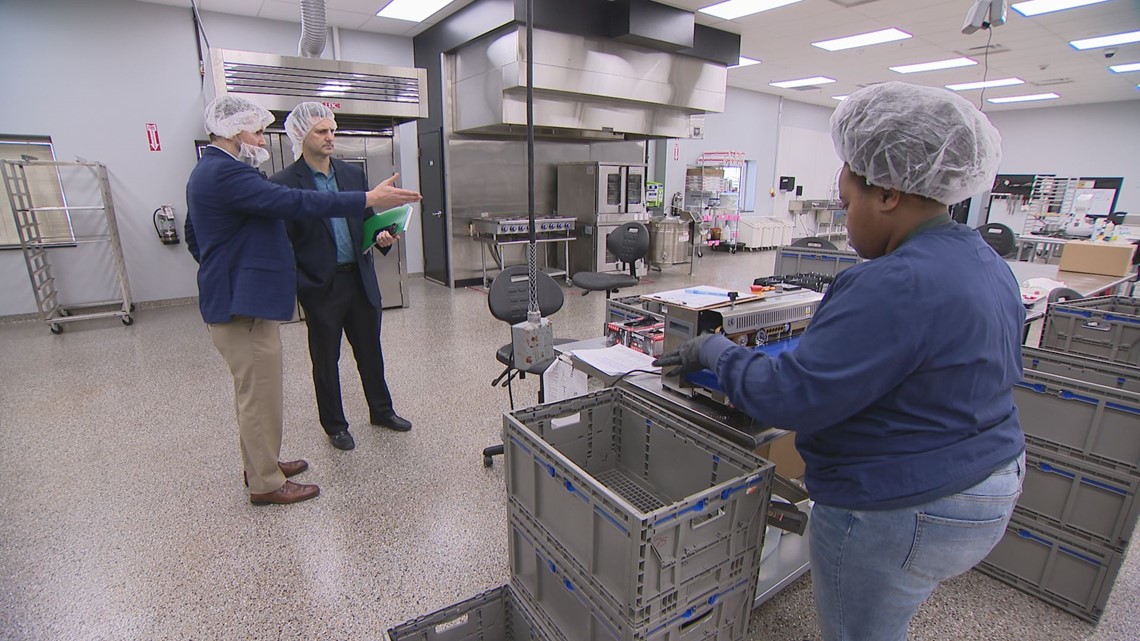
“At the end of the day, everything starts with testing,” he said. “Right now, there's no standardization in the testing industry. You could send your stuff into ten different labs and get ten different results.”
But right now, no agency in Indiana is regulating Delta 8 or how its tested. And no one’s enforcing the hemp laws that do exist. Indiana State Police tell 13 Investigates two of the Delta-8 products purchased for our investigation violate state law regardless of how much Delta-9 is in them because all smokable hemp is still considered illegal in Indiana. And yet those products are still being sold in smoke shops and gas stations all over town.
When asked who should be monitoring and regulating Delta-8 products, the ISP superintendent shook his head.
"It's a great question. I don't know the answer right now … I do know at this point, no one's doing it," Carter said.

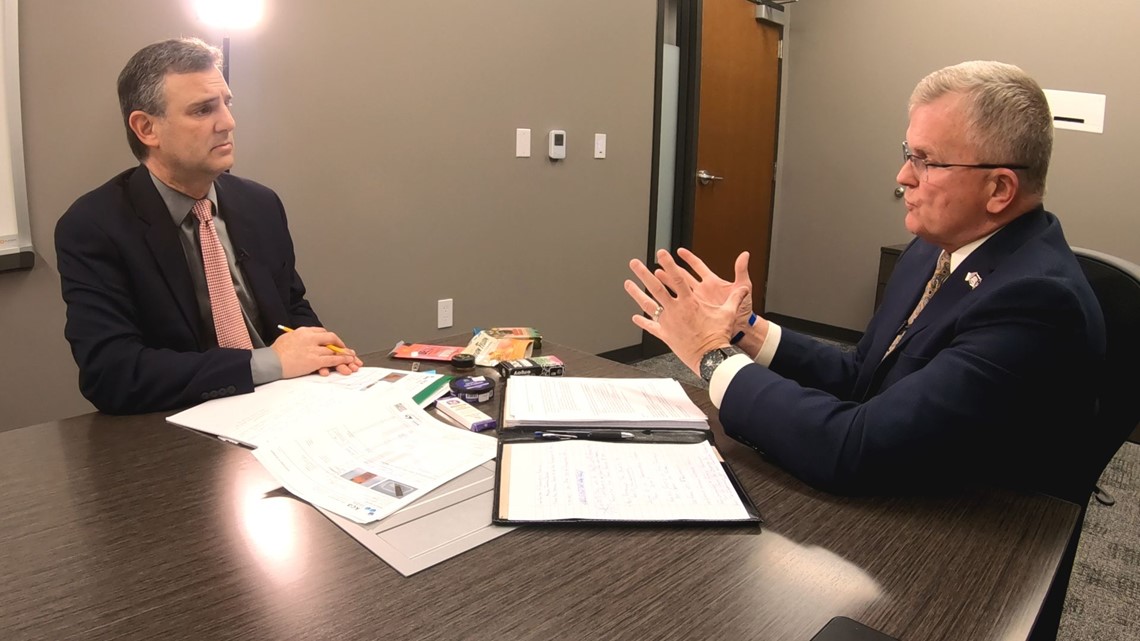
Carter also told 13News the lack of regulation and proper testing is putting consumers and store owners in jeopardy. The Midwest Hemp Council agrees.
"There's a lot of crap product pouring into Indiana right now. Clearly you cannot trust what's in these products," said MHC president Justin Swanson, who's also an attorney specializing in cannabis issues. "You're possessing marijuana at that point whether you realize it or not. There's no repercussions for selling essentially marijuana in Indiana out of the gas station."
In recent years, the Indiana General Assembly has considered multiple bills to place further regulations on Delta-8 products, including banning the sale of Delta-8 to customers who are under 21 years of age. Lawmakers have failed to pass any of the bills.


Manufacturer, retailer and lab responses
Because KCA test results showed multiple products tested for this investigation contain Delta-9 THC levels above the state's legal limit, 13 Investigates reached out to the companies that made those products and the stores that sold them.
Managers and employees at all of the stores told 13News they were surprised about the test results and did not know some of their products contain illegal amounts of Delta-9 THC. Some said they would remove the products while they contact their distributors to do more research.
Of the four companies that had products that tested over the state limit for Delta-9 THC, two companies did not respond before publication. 13 Investigates sent multiple emails and left phone messages for Zaza and Cactus Labs. Zaza makes the Liquid Diamonds Watermelon Kush disposable vape, and Cactus Labs makes the Glock-9 Stoner Blend vape. Neither company responded to 13News’ requests for comment.
An attorney for Curevana contacted 13 Investigates to say the company was working on a response but would not have it before the 13News report aired. He noted that the product is tested at several points in the process. Curevana makes both the Delta-8 flower and the Delta-8 joints that 13News had tested.
Royal Remedies makes the Delta-8 Granddaddy Purple disposable vape. Company president Romas Marcin wrote, "All of the products we manufacture comply with the 2018 Farm Bill and contain less than 0.3% D9 THC by dry weight." He said his company uses two ISO-certified and DEA-licensed laboratories and tests both the original material used in the manufacturing and the finished products. Both labs use a high-performance liquid chromatography testing method. Marcin shared tests of the vape liquid from a second lab. The two reports found the level of Delta-9 THC in the Royal Remedies vape to be "unidentified" and "not detected."
Marcin said the difference between what his company's lab found and what's the tests commissioned by 13News found could be "attributed to minimal standardization when it comes to testing methods and SOPS when testing cannabinoid products containing D8, D9 and D10." He pointed to a document he said is from PharmLabs LLC, one of the testing companies used by Royal Remedies, that examines the challenges of testing and separating the Delta-8 and Delta-9 compounds during testing. The PharmLabs report notes, "Laboratories have conflicting interpretations on identification of delta8-THC and delta9-THC" and that "extensive method development is needed at this time to accurately separate and resolve the two compounds."
In the paper, PharmLabs says it believes a peak on the chart of results is a combination of both Delta-8 and Delta-9, with the "majority, if not all" of the peak being Delta-8. As a result, the paper notes that PharmLabs plans to report that peak as "unidentified."
Labs stand by their results
13 Investigates also contacted the testing labs.
PharmLabs tested four of the products purchased by 13News. All PharmLabs results for Delta-9 THC were reported as unidentified. HPLC testing by KCA Labs identified Delta-9 in all four of the products, and KCA results showed three of the products contained Delta-9 THC levels above Indiana law. Greg Magdoff, PharmLabs CEO and founder, sent 13News the following response:
"First off, I would like to state that we firmly stand behind PharmLabs lab testing results. PharmLabs is required to use HPLC analysis in California for regulatory testing as do most other states that have regulated cannabis. That is due to the required separation of THCa and D9 which GC MS/MS cannot achieve. GC MS/MS uses heat and decarboxylates THCa into D9 THC where HPLC does not use heat and instead uses liquid solvent for separation of isomers. There is a specific law in CA where you must use HPLC and a specific standardized method for cannabis testing of potency of cannabinoids. California regulations and HPLC instrumentation has been considered the gold standard for testing cannabis for the last decade. GC MS/MS has only become a popular solution for helping separate D8 isomers and D9 THC over the last 5 months. PharmLabs has recently added the GC MS/MS test method to help separate some of the D8 isomers. CA now defines total THC as D8+D9+D10 and must be under .3% and many other states will be following soon.
Unfortunately, there is zero traceability for the samples in question to prove that they were in fact the same samples that were tested at each lab. I would estimate that the samples are completely different from each lab, as the dates PharmLabs tested these samples were from February of 2023 through September of 2023, anywhere from 5 months to a year apart from when KCA tested the 4 samples. There is no record of how these samples were handled, stored (degradation) or if they are even in fact the same sample from the same batch as the samples PharmLabs tested back in 2023. In California, Labs are required to go to the manufacturer site and do the sampling on camera and bring the sample immediately back to the lab with full documentation and traceability.
The testing we have done for these COA's in question is research & development (R&D) testing which is not any type of regulatory testing and for the knowledge of the manufacturer to ensure formulations and label claims of their products. These 4 COA's in question clearly alert and notify the manufacturer that the HPLC results were inconclusive and may contain D9 THC."
Magdoff said PharmLabs recently added GC-MS/MS testing methods to its lab to specifically aid in the separation and analysis of Delta-8 isomers.
"While we still primarily use HPLC for our California state regulatory cannabis testing, including California hemp testing, we have introduced GC-MS/MS as an additional tool for certain purposes. The introduction of GC-MS/MS allows us to further confirm Delta-8 isomers for non-compliance or for research and development testing, particularly for clients outside of California who may require additional data for their formulations and research purposes. While HPLC remains our primary method for regulatory testing, we believe that GC-MS/MS can provide complementary insights, especially when used in conjunction with HPLC. While both HPLC and GC-MS/MS have their strengths and limitations, we have found that GC-MS/MS can offer enhanced separation capabilities for certain compounds, potentially providing additional clarity and accuracy in determining cannabinoid potency, particularly for Delta-8 products. However, it's important to note that both methods have their place in our testing protocols, and we utilize them based on the specific needs of our clients and the requirements of regulatory compliance."
ACS Laboratories provided the COA posted on the Cactus Labs' website for the Glock-9 Stoner Blend vape purchased by 13News. ACS is a Florida-based company that says it is a state Department of Health "Certified Marijuana Testing Laboratory."
ACS reported the Delta-9 level in the Glock-9 vape as 1.80%, which is six times the limit allowed in Indiana. It is also slightly higher than the 1.64% result during testing conducted by the lab hired by 13News. ACS says it would expect to see some variance between its test result and the test result from KCA Labs, and that the difference could be due to sample preparation or instrumentation. Cactus Labs did not respond to our questions about its product, its packaging, its test results and the level of Delta-9 THC in its product.
ACS representative Masha Ty told 13News, "Our responsibility to our clients is to report the results in the most accurate and efficient manner possible. We do not interpret the results."
ACS says it uses HPLC-UV (high-performance liquid chromatography-UV) for testing, and that the company has developed a testing method that runs for a longer time than usual to help it accurately separate the Delta-8 and Delta-9 peaks.

